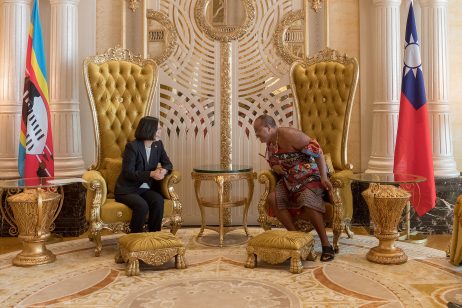Under President Tsai Ing-wen, Taiwan has turned away from China and embraced the rest of the world. But the country has found out the hard way that diplomacy can carry moral cost.
Radio Taiwan International
Date: January 07, 2020
By Nick Aspinwall

President Tsai of Taiwan and King Mswati III of eSwatini, April 17, 2018.
Credit: Office of the President, ROC (Taiwan)
“Taiwan will be an indispensable partner for the international community,” Tsai said.
Tsai, who is seeking a second term as president in Saturday’s elections, knew this would always be a hard sell. Only 22 countries had diplomatic relations with Taipei at the time; today, that number has dwindled to 15. Beijing has campaigned to poach Taipei’s allies and to pressure international organizations and corporations to exclude Taiwan, from the World Health Assembly to Marriott and American Airlines. The United Nations, which does not recognize Taiwan, has stopped allowing Republic of China passport holders into its New York headquarters.
The Chinese government is no fan of Tsai and her Democratic Progressive Party (DPP), which does not recognize the so-called “1992 consensus” — considered by Beijing to be indispensable for cross-strait exchanges but by Tsai to be a gateway to “one country, two systems.” To Beijing, Tsai’s refusal to acknowledge the “consensus” is a tacit rejection of the idea of “one China,” and it has responded by limiting Taiwan’s international space and severing the official cross-strait communications that had thrived under Tsai’s predecessor, Ma Ying-jeou. [FULL STORY]

